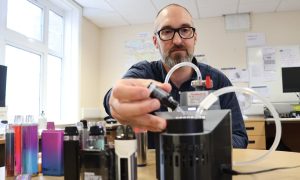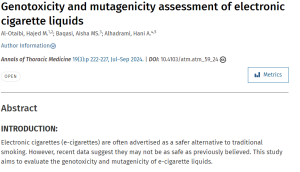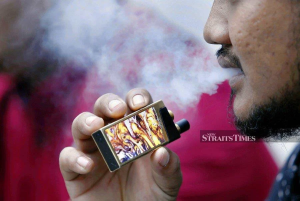LETTERS: No one says vaping is a safe alternative to smoking. So, why are we now legitimising vaping when we are taking steps to introduce an anti-smoking law?
Currently, the law regarding the possession, distribution and advertisement of electronic smoking devices (ESDs) is too vague, allowing underaged Malaysians to buy the products either at physical stores or online platforms.
Youths and children are attracted to ESDs, commonly called vape, as they perceive the device as “the lesser evil”, “cool” and “harmless”.
Data show that ESDs contain hundreds of harmful substances, mainly nicotine, vegetable glycol, propylene glycol, heavy metals, volatile organic compounds, and artificial colourings and flavourings.
Nicotine can cause severe addiction after the first few puffs and this poisonous substance has been transferred to the Food Act, as recently announced by the health minister.
A generational endgame (GEG) Bill is the most effective way to prevent smoking and vaping among children and teenagers. The government introduced a GEG bill in Parliament to ban smoking for anyone born after 2007.
Although the Bill has been deferred pending a review by a committee because some lawmakers considered its enforcement provisions too draconian, its need is not in question.
In accordance with the Child Act 2001 (Act 611), every child has the right to the best healthcare and safety, thus they must be protected from the harms of smoking and vaping.
The GEG bill is meant to help teenagers and future generations to enjoy a healthy smoke-free lifestyle, and it will also help to cut down on the government’s healthcare costs.
Concerns about harsh punishments for teenagers found vaping do not apply anymore as those provisions in the bill have been revised to a milder and more educational approach. Hopefully, this bill will open the hearts and minds of our younger generation that it is meant to protect them.
Many of our neighbours, such as Brunei, Singapore and Thailand, have banned the sale of e-cigarettes.
Our government is now imposing an excise tax of 40 cents per ml on e-cigarette gels containing nicotine from April 1. It was also reported that half of the excise duty revenue collected from the nicotine products will be channelled to the Health Ministry “to improve the quality of health services”.
E-cigarette use is linked to oral cancer, such as tongue cancer, and dentists around the world have raised their concerns that oral cancer can happen to people as early as in their 30s if they start vaping during their teens. The tax revenue from ESD will not be enough to treat a person with oral cancer.
Vaping is also associated with seizures, cardiovascular and mental illnesses that will need almost a lifetime of treatment. This will burden the government even more through rising healthcare costs. Long-term effects of vaping include asthma, lung scarring and other organ damage. The excise duty on vaping is not a deterrent for those who are and could be addicted to vaping.
Is prevention not better than cure? If vaping is banned, as it is in Johor, isn’t that better than to collect taxes to ameliorate its harmful effects?
The aerosols that result from exhaling vaping gels contain potentially harmful substances, and people around vapers are also at risk from second-hand smoke.
Legitimising vaping will result in the proliferation of many outlets offering similar services that could tempt our youth to the harmful habit.
If a demographic study is conducted on vapers, it will be found that those in the B40 group will be the most susceptible, followed by the M40 group. This will reduce the productivity of the nation.
Malaysians should be aware of the advocacy and prevention programmes that have been done for the past few years. In a recent secondary school advocacy programme for the prevention of smoking and vaping, students reported they could easily access vaping products without having to show their identification.
To make matters worse, they are putting in additional illicit drugs and even road tar into the e-cigarette juice to have a “high” effect. Nonetheless, these teenagers are pleading for help to stop vaping as they are aware of its harmful effects on their physical and mental health, and their future.
We must listen to their pleas for help. We should help wean them away from this harmful habit and lead a healthy lifestyle. After all, we want this age group to eventually become responsible role models for their offspring.
So, let’s support the proposed anti-smoking bill to also ban those born after 2007 from vaping.
Let’s support the GEG bill to be approved by the Parliament this year, and not later as proposed by the tobacco industry.
TAN SRI LEE LAM THYE
Kuala Lumpur
Source: New Straits Times










